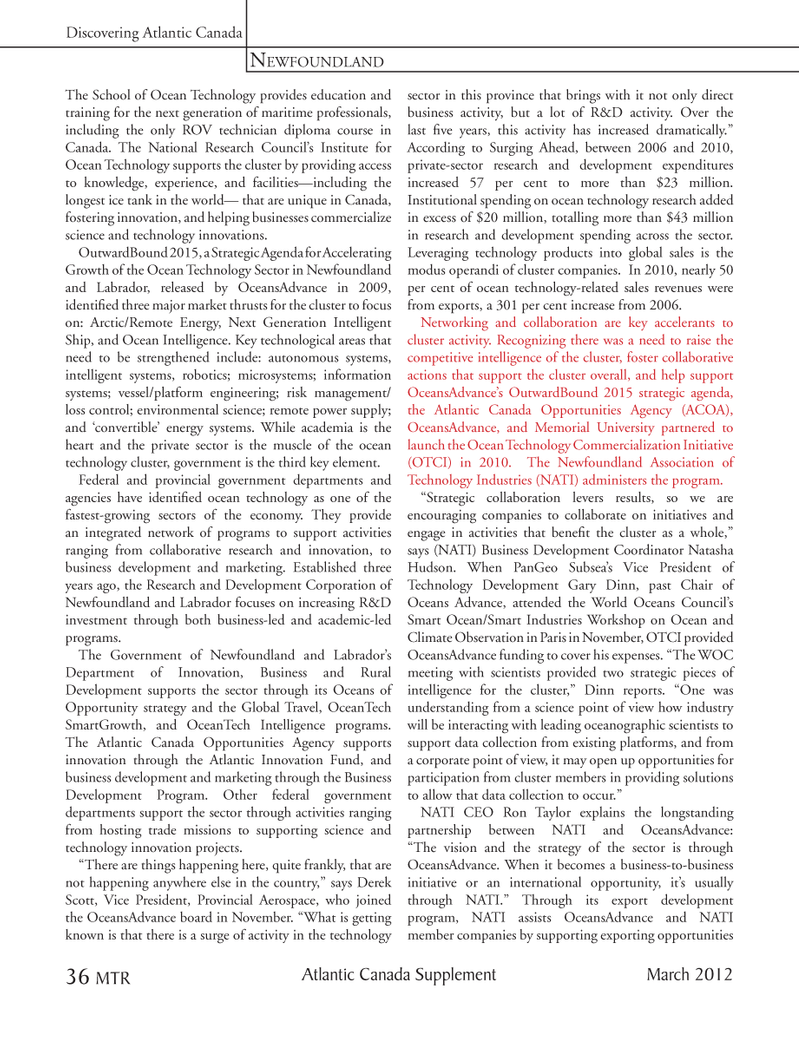
Page 36: of Marine Technology Magazine (March 2012)
Subsea Vehicle Report – Unmanned Underwater Systems
Read this page in Pdf, Flash or Html5 edition of March 2012 Marine Technology Magazine
Atlantic Canada Supplement36 MTRMarch 2012 The School of Ocean Technology provides education and training for the next generation of maritime professionals, including the only ROV technician diploma course in Canada. The National Research Council?s Institute for Ocean Technology supports the cluster by providing access to knowledge, experience, and facilities?including the longest ice tank in the world? that are unique in Canada, fostering innovation, and helping businesses commercialize science and technology innovations. OutwardBound 2015, a Strategic Agenda for Accelerating Growth of the Ocean Technology Sector in Newfoundland and Labrador, released by OceansAdvance in 2009, identi ed three major market thrusts for the cluster to focus on: Arctic/Remote Energy, Next Generation Intelligent Ship, and Ocean Intelligence. Key technological areas that need to be strengthened include: autonomous systems, intelligent systems, robotics; microsystems; information systems; vessel/platform engineering; risk management/ loss control; environmental science; remote power supply; and ?convertible? energy systems. While academia is the heart and the private sector is the muscle of the ocean technology cluster, government is the third key element. Federal and provincial government departments and agencies have identi ed ocean technology as one of the fastest-growing sectors of the economy. They provide an integrated network of programs to support activities ranging from collaborative research and innovation, to business development and marketing. Established three years ago, the Research and Development Corporation of Newfoundland and Labrador focuses on increasing R&D investment through both business-led and academic-led programs. The Government of Newfoundland and Labrador?s Department of Innovation, Business and Rural Development supports the sector through its Oceans of Opportunity strategy and the Global Travel, OceanTech SmartGrowth, and OceanTech Intelligence programs. The Atlantic Canada Opportunities Agency supports innovation through the Atlantic Innovation Fund, and business development and marketing through the Business Development Program. Other federal government departments support the sector through activities ranging from hosting trade missions to supporting science and technology innovation projects. ?There are things happening here, quite frankly, that are not happening anywhere else in the country,? says Derek Scott, Vice President, Provincial Aerospace, who joined the OceansAdvance board in November. ?What is getting known is that there is a surge of activity in the technology sector in this province that brings with it not only direct business activity, but a lot of R&D activity. Over the last ve years, this activity has increased dramatically.? According to Surging Ahead, between 2006 and 2010, private-sector research and development expenditures increased 57 per cent to more than $23 million. Institutional spending on ocean technology research added in excess of $20 million, totalling more than $43 million in research and development spending across the sector. Leveraging technology products into global sales is the modus operandi of cluster companies. In 2010, nearly 50 per cent of ocean technology-related sales revenues were from exports, a 301 per cent increase from 2006. Networking and collaboration are key accelerants to cluster activity. Recognizing there was a need to raise the competitive intelligence of the cluster, foster collaborative actions that support the cluster overall, and help support OceansAdvance?s OutwardBound 2015 strategic agenda, the Atlantic Canada Opportunities Agency (ACOA), OceansAdvance, and Memorial University partnered to launch the Ocean Technology Commercialization Initiative (OTCI) in 2010. The Newfoundland Association of Technology Industries (NATI) administers the program. ?Strategic collaboration levers results, so we are encouraging companies to collaborate on initiatives and engage in activities that bene t the cluster as a whole,? says (NATI) Business Development Coordinator Natasha Hudson. When PanGeo Subsea?s Vice President of Technology Development Gary Dinn, past Chair of Oceans Advance, attended the World Oceans Council?s Smart Ocean/Smart Industries Workshop on Ocean and Climate Observation in Paris in November, OTCI provided OceansAdvance funding to cover his expenses. ?The WOC meeting with scientists provided two strategic pieces of intelligence for the cluster,? Dinn reports. ?One was understanding from a science point of view how industry will be interacting with leading oceanographic scientists to support data collection from existing platforms, and from a corporate point of view, it may open up opportunities for participation from cluster members in providing solutions to allow that data collection to occur.? NATI CEO Ron Taylor explains the longstanding partnership between NATI and OceansAdvance: ?The vision and the strategy of the sector is through OceansAdvance. When it becomes a business-to-business initiative or an international opportunity, it?s usually through NATI.? Through its export development program, NATI assists OceansAdvance and NATI member companies by supporting exporting opportunities NEWFOUNDLAND Discovering Atlantic Canada MTR2 Canada Supplement 32-48.indd 36MTR2 Canada Supplement 32-48.indd 362/22/2012 3:08:14 PM2/22/2012 3:08:14 PM

 35
35

 37
37
